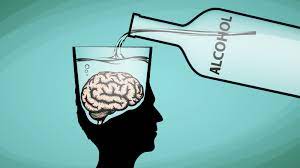Wet Brain Syndrome: Is It A Risk?
When a person gets subjected to alcohol addiction for a long time. He is at risk of developing several severe chronic conditions. This syndrome is also referred to as the Wernicke-Korsakoff syndrome (WKS).
It is a life-threatening brain disorder that consists of two stages, namely Wernicke’s encephalopathy and Korsakoff’s psychosis. However, those who battle alcoholism may prioritize drinking alcohol rather than maintaining a healthy diet that includes whole grains and lean proteins.
The liver stores and releases thiamine into circulation in modest amounts, but liver damage caused by persistent alcohol use can prevent this. one can receive thiamine only via nutrition, an essential component used by every portion of the body. The heart, nerves, and brain get harmed by thiamine deficiency.
Is Wet Brain Reversible?
Wernicke’s encephalopathy, the initial stage of wet brain, is completely curable with thiamine injections and the avoidance of alcohol. The person will eventually develop Korsakoff’s psychosis if the condition is not adequately treated and they continue to drink. The remaining problem can then only be partially remedied.
While there is no known treatment for wet brain, if medical professionals can act fast enough, they may be able to reverse some symptoms or at the very least halt the disorder’s development. Whereas we can slightly improve regular memory loss with medication and treatment.
The best chance of turning the disease around and saving a person’s life in Wernicke-Korsakoff syndrome instances is early intervention. To avoid or reduce the risk of lasting brain damage, those who show indications of wet brain symptoms need to get help for their alcoholism and become and remain sober.
How Common Is It?
Up to 2% of the adult population in the United States has Wernicke-Korsakoff syndrome, while around 80% of those with alcohol use disorder are thiamine deficient. Who has a wet brain due to alcohol consumption or poor nutrition is not well understood, though. The number of persons with severe alcoholism who do not seek treatment or who are homeless and are not assessed for the disorder makes it impossible to quantify how many people have wet brains.
Conclusion
Although it can be fatal, alcoholism is curable. There are ways to prevent or at least decrease some of the health problems that excessive and extended drinking can cause. However, receiving care from a group of qualified specialists is essential. IV At Home Dubai visit us for more information.




